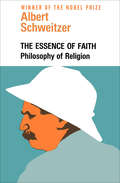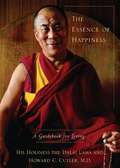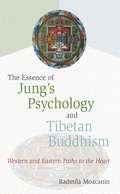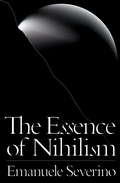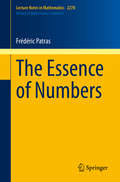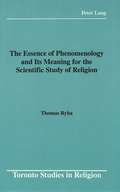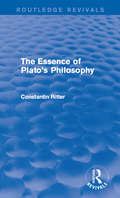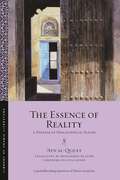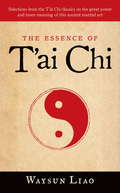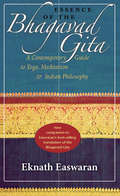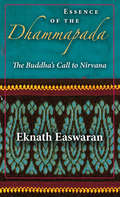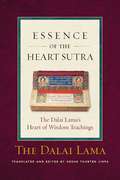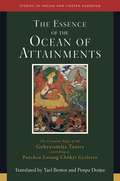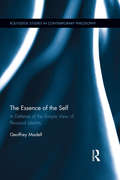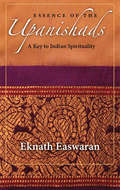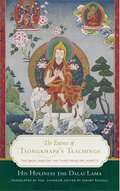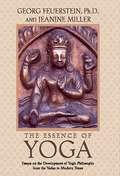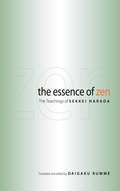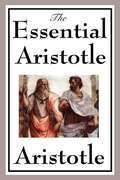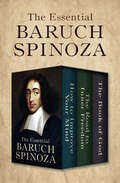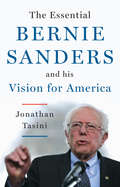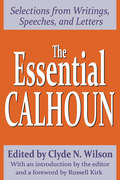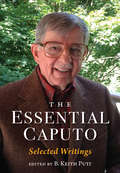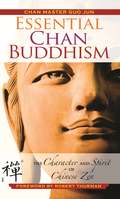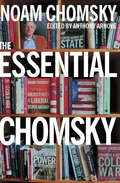- Table View
- List View
The Essence of Faith: Philosophy of Religion
by Albert SchweitzerThe Nobel Peace Prize–winning doctor, theologian, and missionary explores the essence of faith in this masterful early work on Kantian metaphysics. Famous for his medical missionary work in what is now the West African country of Gabon, Albert Schweitzer was an accomplished theologian, philosopher, and international bestselling author. While studying for his PhD at the Sorbonne, Schweitzer developed his views on theology through an analysis of Immanuel Kant&’s philosophy of religion. In The Essence of Faith, Schweitzer explores Kantian ideas to arrive at an inspiring meditation on God, faith, and the limits of human understanding. Both an accessible introduction to Schweitzer&’s theology and a strikingly original approach to Kant&’s writing and thought, The Essence of Faith is a slim volume of profound ideas.
The Essence of Happiness
by Dalai Lama Howard C CutlerThe essence of the iconic book The Art of Happiness distilled into a beautiful new format. The Dalai Lama inspired millions around the world with his wisdom and compassion in The Art of Happiness. Now, in The Essence of Happiness, moving insights from His Holiness are gathered in an elegantly designed keepsake book that makes for a handy and accessible medium for that wisdom. Offering sage advice on defeating day-to-day depression, anxiety, anger, jealousy, and other emotions that get in the way of true happiness, the pages of The Essence of Happiness contain transforming reflections on how to overcome suffering and obstacles to create a fulfilled, joyous life. With its new package, ideal for taking anywhere, The Essence of Happiness is poised to become the handbook for living.
The Essence of Jung's Psychology and Tibetan Buddhism
by Radmila MoacaninThe Essence of Jung's Psychology and Tibetan Buddhism cuts to the heart of two very different yet remarkably similar traditions. The author touches on many of their major ideas: the collective unconscious and karma, archetypes and deities, the analyst and the spiritual friend, and mandalas. Within Tibetan Buddhism she focuses on tantra and relates its emphasis on spiritual transformation, also a major concern of Jung. This expanded edition includes new material on the integration of the two traditions, and the importance of these paths of the heart in today's unsteady world.
The Essence of Nihilism
by Alessandro Carrera Emanuele Severino Giacomo Donis Ines TestoniA groundbreaking classic of contemporary philosophy for the first time in English translationBetween 1961 and 1970, Emanuele Severino was subjected to a thorough investigation by the Vatican Inquisition. The "fundamental incompatibility" identified between his thought and Christian doctrine ejected him from his position as Professor of Philosophy at the Catholic University in Milan. The Essence of Nihilism, published in 1972, was the first book to follow his expulsion, and it established Severino's preeminent position within the the constellation of contemporary philosophy.In this groundbreaking and classic book--now for the first time available in English--Severino reinterprets the history of Western philosophy as the unfolding of "the greatest folly," that is, of the belief that "things come out of nothing and fall back into nothing." According to Severino, such a typically Western understanding of reality has resulted in a conviction that there is a radical "nothingness" to existence. In turn, this justifies the treatment of the world as an object of exploitation, degradation and destruction. To move beyond Western nihilism, suggests Severino, we must first of all "return to Parmenides." Joining forces with the most venerable of Greek philosophers, Severino confutes nihilism's "path of night", and develops a new philosophy grounded on the principle of the eternity of reality and of every single existent thing.From the Trade Paperback edition.
The Essence of Numbers (Lecture Notes in Mathematics #2278)
by Frédéric PatrasThis book considers the manifold possible approaches, past and present, to our understanding of the natural numbers. They are treated as epistemic objects: mathematical objects that have been subject to epistemological inquiry and attention throughout their history and whose conception has evolved accordingly. Although they are the simplest and most common mathematical objects, as this book reveals, they have a very complex nature whose study illuminates subtle features of the functioning of our thought. Using jointly history, mathematics and philosophy to grasp the essence of numbers, the reader is led through their various interpretations, presenting the ways they have been involved in major theoretical projects from Thales onward. Some pertain primarily to philosophy (as in the works of Plato, Aristotle, Kant, Wittgenstein...), others to general mathematics (Euclid's Elements, Cartesian algebraic geometry, Cantorian infinities, set theory...). Also serving as an introduction to the works and thought of major mathematicians and philosophers, from Plato and Aristotle to Cantor, Dedekind, Frege, Husserl and Weyl, this book will be of interest to a wide variety of readers, from scholars with a general interest in the philosophy or mathematics to philosophers and mathematicians themselves.
The Essence of Phenomenology and Its Meaning for the Scientific Study of Religion
by Thomas RybaReligious studies is rife with confusion over what the phenomenology of religion is. Conventional approaches dwell on the dissimilarity of the meanings of 'phenomenology' and 'phenomenology of religion' and ignore their synonymy. The purpose of this book is to challenge this trend by examining seven significant historical examples of philosophical phenomenology in order to develop a synthetic definition of 'phenomenology' which will both resolve the perceived conflicts in meaning and lead to a useful augmentation of religious methodology.
The Essence of Plato's Philosophy (Routledge Revivals)
by Constantin RitterThis book, first published in English in 1933, provides a detailed analysis of the life and concepts of the Greek philosopher Plato. The Essence of Plato’s Philosophy explores epistemology and ontology, the philosophy of nature, ethics and the philosophy of the state, and aesthetics and religion. This book will be of interest to students of philosophy.
The Essence of Reality: A Defense of Philosophical Sufism (Library of Arabic Literature)
by ʿAyn al-QuḍātA groundbreaking exposition of Islamic mysticism The Essence of Reality was written over the course of just three days in 514/1120, by a scholar who was just twenty-four. The text, like its author ʿAyn al-Quḍāt, is remarkable for many reasons, not least of which that it is in all likelihood the earliest philosophical exposition of mysticism in the Islamic intellectual tradition. This important work would go on to exert significant influence on both classical Islamic philosophy and philosophical mysticism. Written in a terse yet beautiful style, The Essence of Reality consists of one hundred brief chapters interspersed with Qurʾanic verses, prophetic sayings, Sufi maxims, and poetry. In conversation with the work of the philosophers Avicenna and al-Ghazālī, the book takes readers on a philosophical journey, with lucid expositions of questions including the problem of the eternity of the world; the nature of God’s essence and attributes; the concepts of “before” and “after”; and the soul’s relationship to the body. All these discussions are seamlessly tied into ʿAyn al-Quḍāt’s foundational argument—that mystical knowledge lies beyond the realm of the intellect.An English-only edition.
The Essence of T'ai Chi
by Waysun LiaoThe deepest benefits of T'ai Chi cannot be realized without an understanding of its underlying principles. This book presents these principles through translations of three core classics of T'ai Chi that are often considered the "T'ai Chi Bible," accompanied by the author's insightful commentary. Master Liao demonstrates how to increase the body's inner energy (ch'i) and transform it into power, health, and well-being. By reading the clear and precise explanations of the fundamental principles of T'ai Chi, students can develop a more complete understanding of the art and philosophy of this traditional martial art.
Essence of the Bhagavad Gita
by Eknath EaswaranThe Bhagavad Gita opens with a crisis -- Prince Arjuna despairs on the battlefield, unsure if he should fight his kinsmen in a dreadful war. For Easwaran, the Gita's epic battle represents the war in our own hearts and Arjuna's anguish reflects the human condition: torn between opposing forces, confused about how to live. Sri Krishna's timeless guidance, Easwaran argues, can shed light on our dilemmas today. Placing the Gita's teachings in a modern context, Easwaran explores the nature of reality, the illusion of separateness, the search for identity, the meaning of yoga, and how to heal the unconscious. The key message of the Gita is how to resolve our conflicts and live in harmony with the deep unity of life, through the practice of meditation and spiritual disciplines. Sri Krishna doesn't tell Arjuna what to do. He points out the prince's choices, and then leaves it to Arjuna to decide. Easwaran shows us clearly how these teachings still apply -- and how, like Arjuna, we must take courage and act wisely if we want our world to thrive.
Essence of the Dhammapada
by Eknath EaswaranEknath Easwaran, translator of the best-selling edition of the Dhammapada, sees this powerful scripture as a perfect map for the spiritual journey. Said to be the text closest to the Buddha's actual words, it is a collection of short teachings memorized during his lifetime by his disciples. Easwaran presents the Dhammapada as a guide to spiritual perseverance, progress, and ultimately enlightenment - a heroic confrontation with life as it really is, with straight answers to our deepest questions. We witness the heartbreak of death, for instance - what does that mean for us? What is love? How does karma work? How do we follow the spiritual life in the midst of work and family? Does nirvana really exist, and if so, what is it like to be illumined?In his interpretation of Buddhist themes, illustrated with stories from the Buddha's life, Easwaran offers a view of the concept of Right Understanding that is both exhilarating and instructive. He shares his experiences on the spiritual path, giving the advice that only an experienced teacher and practitioner can offer, and urges us to answer for ourselves the Buddha's call to nirvana - that mysterious, enduring state of wisdom, joy, and peace.
Essence of the Heart Sutra
by Thupten Jinpa His Holiness the Dalai LamaFor more than two thousand years, the Heart Sutra has been part of the daily life of millions of Buddhists. This concise text, so rich and laden with meaning, concentrates the very heart of Buddhism into a powerful and evocative teaching on the interdependence of all reality. In Essence of the Heart Sutra, the Dalai Lama masterfully unpacks the Heart Sutra so that any reader can benefit from its teachings - teachings meant to help us release ourselves from suffering and live with true compassion. Comprised of his ""Heart of Wisdom"" talks, originally delivered to thousands of listeners in 2001, the book offers the Dalai Lama's commentary as well as his easy-to-follow overview of Buddhist philosophy that places the sutra within its historical and philosophical context. With additional contributions by scholar and translator Thupten Jinpa, Essence of the Heart Sutra is the authoritative presentation of a text seminal to the world's religious heritage.
Essence of the Ocean of Attainments: The Creation Stage of the Guhyasamaja Tantra according to Panchen Losang Chökyi Gyaltsen (Studies in Indian and Tibetan Buddhism #21)
by Yael Bentor Penpa DorjeeA comprehensive guide to the creation stage of the Guhyasamaja. The Essence of the Ocean of Attainments (Dngos grub rgya mtsho’i snying po) is a commentary on the creation stage of the Guhyasamaja Tantra written by the illustrious Panchen Lama, Losang Chökyi Gyaltsen (1570–1662). The practice of Guhyasamaja, one of the earliest and most influential of the highest Tantras, along with its remarkable hermeneutic system, created a framework that was applied to other so-called unexcelled Tantras. Still very much a living tradition, in our time the Fourteenth Dalai Lama confers its empowerment every year. In this work, the Panchen Lama not only clarifies each step of the sadhana meditation ritual, but he also offers general insights into the practice and its workings. It is an Essence because it distills the much longer Ocean of Attainments commentary on the practice composed by Khedrup Jé (1385–1438), one of two key disciples of Tsongkhapa, the founder of Tibetan Buddhism’s Geluk school. The Panchen Lama identifies core elements of sadhana and with unparalleled precision clarifies many seminal points. In her introduction, Yael Bentor surveys the creation stage of unexcelled Tantra as presented by the founding fathers of the Geluk school and unpacks the contents of The Essence of the Ocean of Attainments for readers. The translation features both explanatory annotations for practitioners and ample references for scholars.
The Essence of the Self: In Defense of the Simple View of Personal Identity (Routledge Studies in Contemporary Philosophy)
by Geoffrey MadellIn this volume, Geoffrey Madell develops a revised account of the self, making a compelling case for why the "simple" or "anti-criterial" view of personal identity warrants a robust defense. Madell critiques recent discussions of the self for focusing on features which are common to all selves, and which therefore fail to capture the uniqueness of each self. In establishing his own view of personal identity, Madell proposes (a) that there is always a gap between ‘A is f and g’ and ‘I am f and g’; (b), that a complete description of the world offered without recourse to indexicals will fail to account for the contingent truth that I am one of the persons described; and (c), that an account of conscious perspectives on the world must take into account what it means for an apparently arbitrary one of these perspectives to be mine. Engaging with contemporary positions on the first person, embodiment, psychological continuity, and other ongoing arguments, Madell contends that there can be no such thing as a criterion of personal identity through time, that no bodily or psychological continuity approach to the issue can succeed, and that personal identity through time must be absolute, not a matter of degree. Madell’s view that the nature of the self is substantively different from that of objects in the world will generate significant discussion and debate among philosophers of mind.
Essence of the Upanishads
by Eknath EaswaranThrough his interpretation of one important Upanishad, an ancient wisdom text, Eknath Easwaran shows how the timeless Indian tradition offers guidance on how to live today. Lyrical, dramatic, and inspiring, the Katha Upanishad presents the core ideas of Indian mysticism in a mythic story all can relate to - the adventure of a young hero, Nachiketa, who passes into the kingdom of Death in search of immortality. The King of Death tests his resolve, but the teenager stands firm, demanding answers to the age-old questions, "What is the purpose of life? What happens to me when I die?" Death emerges as the perfect spiritual guide - direct, uncompromising, and challenging. Easwaran's approach to the Katha is both practical and universal. He explains key Sanskrit terms like karma and prana, illustrating them through everyday anecdotes and entertaining analogies while placing Indian spirituality into the broader context of world mysticism.
The Essence of Tsongkhapa's Teachings: The Dalai Lama on the Three Principal Aspects of the Path
by Dalai LamaLearn from the Dalai Lama the three steps to awakening: 1) renunciation, 2) the awakening mind, and 3) emptiness.His Holiness the Dalai Lama’s commentary on Tsongkhapa’s Three Principal Aspects of the Path helps us integrate the full Buddhist path into our own practice. His Holiness offers a beautiful elucidation of the three aspects of the path: true renunciation based on the wish for freedom, the altruistic awakening mind ( bodhichitta ), and the correct view of emptiness. These three aspects of the path are the axis of all the practices of both sutra and tantra, and they encapsulate Tsongkhapa’s vision of the Buddhist path in its entirety. In their absence, it is impossible for us to develop the great compassion that aspires to liberate other sentient beings from samsara and we will not be able to go beyond this cycle of existence. Practitioners will find The Three Principal Aspects of the Path invaluable as a manual for daily meditation. The universal and timeless insights of this text speak to contemporary spiritual aspirants, East and West. The root verses are presented in both Tibetan and English translation to accompany these profound teachings.
The Essence of Yoga: Essays on the Development of Yogic Philosophy from the Vedas to Modern Times
by Georg Feuerstein Jeanine MillerA collection of classic essays by two highly regarded scholars on the development of yoga and its rapport with other religious traditions. Georg Feuerstein, one of the world's foremost scholars of yoga, and Jeanine Miller, long recognized for her insightful commentaries on the RgVeda, here pool their considerable talents in a look at the development of yogic thought across the ages and its similarities with the Christian mysticism of Meister Eckhart. Two of their essays included here, one concerning the essence of yoga and the other looking at the meaning of suffering in yoga, have long been singled out by indologists for correcting prevalent misconceptions and providing a conceptual framework for many of the subsequent studies in that field. The reprinting of these important essays in The Essence of Yoga gives new readers a chance to share some of the authors' earliest insights into yoga and their deep conviction that these discoveries are of the highest significance for a proper understanding of the human condition.
The Essence of Zen
by Daigaku Rumme Sekkei HaradaThe Essence of Zen is an expert's guided tour of the ins and outs of the tradition's approach to meditation, enlightenment, and the oneness of all things. To read it is to enter into one of modern Japanese Zen's most subtle and sophisticated minds. Sekkei Harada skillfully pushes us to drop those parts of ourselves that grasp and make demands regarding our understanding or progress in meditation practice. He enables us to see clearly-and steer clear of-the philosophical stumbling blocks that can make the path precarious. The Essence of Zen represents the most succinct of his teachings, making it of immediate value to anyone with an interest in Zen. The book also contains Harada's explanations of the differences between the tradition's primary schools, making it particularly helpful to newcomers.
The Essential Aristotle
by AristotleAristotle was a Greek philosopher and a student of Plato. He taught Alexander the Great, and wrote on many subjects, including physics, metaphysics, poetry, theater, music, logic, rhetoric, politics, government, ethics, biology, and zoology. Together with Plato and Socrates, Aristotle is one of the most important founding figures in Western philosophy. He was the first to create a comprehensive system of Western philosophy, encompassing morality and aesthetics, logic and science, politics and metaphysics. Aristotle's views on the physical sciences profoundly shaped medieval scholarship, and their influence extended well into the Renaissance.
The Essential Baruch Spinoza: How to Improve Your Mind, The Road to Inner Freedom, and The Book of God
by Baruch SpinozaThree philosophical works by the seventeenth-century Enlightenment thinker and author of Ethics.How to Improve Your MindIn this earlier work, Dutch philosopher Baruch Spinoza articulates his view that life is best lived with the supreme happiness of knowing God&’s infinite love. By extension, all earthly pursuits—including money, fame, and sex—are mere distractions from the greater joy of the soul&’s quietude.Translated by the philosopher and founder of the Philosophical Library, Dagobert D. Runes. Runes also provides exclusive commentary and biographical notes.The Road to Inner FreedomSpinoza views the ability to experience rational love of God as the key to mastering the contradictory and violent human emotions.The Book of GodThe Book of God, one of Spinzoa&’s earliest works, came to light only a hundred years ago in two slightly varying Dutch manuscripts. Its youthful author lived in turbulent times, when the Western world was torn by civil and religious strife, and bullies, bigots and pseudo-prophets vied for the ear of a fearful people. While Europe was in an uproar over the right church, Spinoza was seeking the right God. This book is the first known report of his findings. Translated by Dr. A. Wolf from the Dutch [the author&’s Tractatus de Deo et homine version] and edited and with an introduction by Dagobert D. Runes.
The Essential Bernie Sanders and His Vision for America
by Jonathan TasiniMeet the essential Bernie Sanders--an authentic and uncompromising champion of the people. Independent United States Senator Bernie Sanders--with a thirty-five-year career in public service, first as Burlington, Vermont's mayor, then as Vermont's sole representative to Congress, and currently as a United States senator--is now campaigning to become president of the United States. His goal is to build a movement to take back our country from the rich and powerful, and return it to its rightful owners--we, the American people. Sanders' common sense, populist message is resonating with Democrats, Republicans, independents, as well as ordinary working- and middle-class Americans from all walks of life, including millennials, seniors, veterans, immigrants, environmentalists, union workers, and more. In this short, accessible book, author Jonathan Tasini draws heavily from Sanders' ample public record of speeches, statements, and interviews, and couples his working-class spirit with specific legislation he has championed on a number of core proposals that comprise a broader people's agenda for America, including: A national, single-payer health care system; Free public higher education; Taking on wealth and income inequality; Preserving Social Security; Caring for our veterans; Ensuring civil rights for all; Combatting climate change; Reforming Wall Street, and much more. The Essential Bernie Sanders and His Vision for America is a must-read for anyone who shares a vision for a forward-looking, sustainable, and more just United States of America, and is eager to change the course of history.
The Essential Calhoun (The Library of Conservative Thought)
by Clyde N. WilsonJohn C. Calhoun was a major actor in the political history of nineteenth-century America. His dramatic career will always be of interest. However, Calhoun is equally important as a political thinker who continues to elicit widespread interest from the most diverse points of the ideological spectrum. The Essential Calhoun presents a full-fledged selection of speeches and writings taken from the entire forty-year span of Calhoun's public career and from many varieties of occasions, public and private. For the first time, it is possible to appreciate Calhoun fully and to consider his thought within the compass of a single volume.Calhoun is known to posterity as the premier defender of the Old South and slavery and as the theorist of the concurrent majority. His contemporaries knew him as much else, including a political economist and foreign policy authority. As the range of writings shows, he was a valuable and often prophetic commentator.Calhoun's thought testifies to a deep and abiding concern with moral and ethical issues that confront a government resting on the consent of the people. The fundamental question with which he wrestles in all his works is how to achieve and maintain a proper balance between power and liberty in a democratic society. By providing the most representative compendium of his thought, The Essential Calhoun invites the reader to engage in this exercise of applying the moral imagination realistically to the public business of America. Historians, American studies specialists, economists, and political scientists will find this volume indispensible.
The Essential Caputo: Selected Writings
by B. Keith PuttThis landmark collection features selected writings by John D. Caputo, one of the most creative and influential thinkers working in the philosophy of religion today. B Keith Putt presents 21 of Caputo’s most significant contributions from his distinguished 40-year career. Putt’s thoughtful editing and arrangement highlights how Caputo's multidimensional thought has evolved from radical hermeneutics to radical theology. A guiding introduction situates Caputo's corpus within the context of debates in the Continental philosophy of religion and exclusive interview with him adds valuable information about his own views of his work.
Essential Chan Buddhism
by Guo Jun Robert Thurman Kenneth WapnerEssential Chan Buddhism is the rare unearthing of an ancient and remarkable Chinese spiritual tradition. Master Guo Jun speaks through hard-won wisdom on Chan's spiritual themes familiar to Western readers, such as mindfulness and relaxation in meditation, as well as profound, simply expressed teachings and insightful explorations of religious commitment. Essential Chan Buddhism filters formal spiritual practices through the lens of mundane and everyday life activities. The work captures the lyrical beauty and incantatory style of Guo Jun's spoken English from the talks he gave at a fourteen-day retreat near Jakarta in 2010 and in subsequent conversations with his editor Kenneth Wapner. This value-priced hardcover edition is both a distinctive addition to Buddhist collections and a thoughtful gift for anyone looking for spiritual guidance.Chan master Guo Jun is one of a new breed of international teachers taking the world's great wisdom traditions into the twenty-first century. He is currently abbot of Mahabodhi Monastery in Singapore and teaches internationally. Chan master Sheng Yen's youngest dharma heir, he served as abbot of his Pine Bush, New York, retreat center from 2005 to 2008. A native of Singapore, Guo Jun received his full monastic ordination in Taiwan. He is a lineage holder and successor in Chan as well as the Xianshou and Cien schools of Chinese Buddhism. Essential Chan Buddhism is his first book.Kenneth Wapner's Peekamouse Books is a book packager and editor. Clients include Bantam, Tarcher/Putnam, Ballantine, and Doubleday. He is well known for his work on Rabbi Jesus, Bones of the Master, and The Zen of Creativity.
The Essential Chomsky: Essays On Freedom And Democracy (New Press Essential Ser.)
by Noam ChomskyThe seminal writings of America&’s leading philosopher, linguist, and political thinker—&“the foremost gadfly of our national conscience&” (The New York Times). For the past fifty years Noam Chomsky&’s writings on politics and language have established him as a preeminent public intellectual as well as one of the most original political and social critics of our time. Among the seminal figures in linguistic theory over the past century, Chomsky has also secured a place among the most influential dissident voice in the United States. Chomsky&’s many bestselling works—including Manufacturing Consent, Hegemony or Survival, Understanding Power, and Failed States—have served as essential touchstones for activists, scholars, and concerned citizens on subjects ranging from the media and intellectual freedom to human rights and war crimes. In particular, Chomsky&’s scathing critique of the US wars in Vietnam, Central America, and the Middle East have furnished a widely accepted intellectual premise for antiwar movements for nearly four decades. The Essential Chomsky assembles the core of his most important writings, including excerpts from his most influential texts over the past half century. Here is an unprecedented, comprehensive overview of the thought that animates &“one of the West&’s most influential intellectuals in the cause of peace&” (The Independent). &“Chomsky ranks with Marx, Shakespeare, and the Bible as one of the ten most quoted sources in the humanities—and is the only writer among them still alive.&” —The Guardian &“Noam Chomsky is one of the most significant challengers of unjust power and delusions; he goes against every assumption about American altruism and humanitarianism.&” —Edward Said &“A rebel without a pause.&” —Bono
